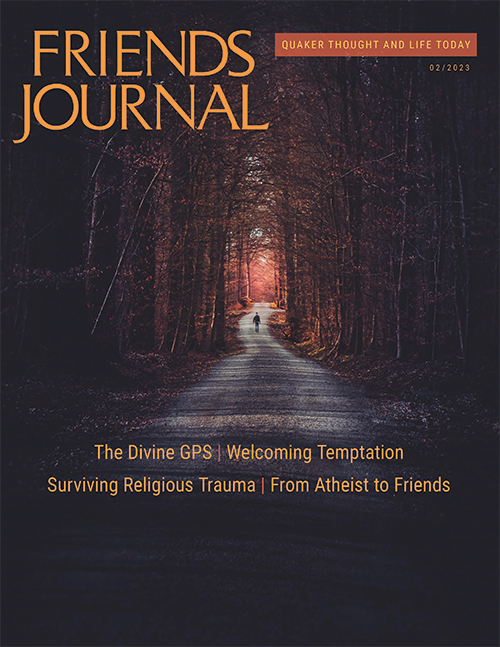Human nature and the meanings of sin
Without surrender to Spirit, a “searching and fearless inventory” of our wrongs, readiness to right our wrongs, and making amends, done continuously, we won’t see the implicit ways in which our privilege harms others by our inaction (“Facing Evil, Finding Freedom” by Adria Gulizia, FJ Dec. 2022). I find that two perspectives on the same topic often illuminate each other.
In this regard, I favor the fourth step of the “Four Immeasurable Minds of Love” the First Buddha used to reach continuous enlightenment (my take based on a few translations): “May my heart be led to experience the sorrows and joys of others equally, without exception.”
When the First Buddha reached enlightenment he gave up his worldly possessions (he was from a very well-off family), refused to have a monastery built for him, and devoted the rest of his life to working among the poor.
Friends with great privilege can participate in a covered worship. It turns out, as your article lays out nicely, that is a moment of false enlightenment. Thank you for adding a perspective from which to view the exclusionary insularity of Friends.
Hank Fay
Berea, Ky.
The author replies: When I was writing this essay, I asked a few non-Christian Friends to read it and let me know if there were any areas that created an “ouch” or were incomprehensible. In that process, one Friend mentioned the potential richness of doing a comparative study of Christian and Buddhist ideas of sin. I’m not qualified to do such a study, but reading your comment makes me convinced that it would be very worthwhile. Thank you so much for sharing, Hank.
Adria Gulizia
Newark, N.J.
This is an excellent exposition on why Friends must re-embrace the theology of our earlier generations if we want to survive as a religious society. I applaud Gulizia for what is obviously a sound understanding of early Friends beliefs, as well as her skill in presenting them to a fresh generation.
When I was at Earlham School of Religion (Class of 2015), my thesis centered on the theological drift among Friends that was a direct result of the rejection of a view of human nature that was far closer to their Puritan neighbors than modern Friends wish to admit. Unfortunately, I found almost no one among Friends (outside of Ohio Yearly Meeting) who seemed willing to accept my conclusions.
John Connell
Camby, Ind.
Friends need to rediscover the thinking of our earliest generations on a number of topics. Gulizia’s consistent and cheerful leadership in this regard among Friends has been inspiring to me for a long time. Thank you for this article. I hope it opens hearts and minds on this topic.
Patrick Nugent
Dayton, Ohio
This article hit me hard, and it also brought me face-to-face with my own past. In the anti-LGBTQ+ Evangelical churches I attended before coming out gay and then becoming a Quaker, words like sin and evil became replacements for gay. Accepting that my desires are not evil took a lot of work, and it took a supportive loving community. But it also meant shoving these words to the back of the closet I had exited.
For this reason, I was thrilled to chat with Adria for an episode of Friends Publishing’s Quakers Today podcast (QuakersToday.org, episode 2, Dec. 13, 2022). It was especially useful to hear the steps that led Adria to write the article. It was a wonderful conversation, and I found it very helpful. Thank you, Adria, for this excellent essay and the thought-provoking questions you raise in it.
Peterson Toscano (host of Quakers Today)
Sunbury, Pa.
I wish we wouldn’t use the word sin. The word comes from the Old English word syn, which meant violation of divine law; breaking God’s commandment. True, our human condition does succumb to those serious offenses, but there are other Greek words in the Bible that do not accurately translate to that definition. Paraptoma means to go off the path, and hamartia means to miss the mark; miss the bull’s eye. Unfortunately, there is no one-word translation for these more nuanced Greek words, but they certainly expand the type and degree of flaws, slip-ups, omissions, and mistakes that produce regret and require atonement, just as Adria Gulizia outlines in her excellent article.
Alton Fly
Abington, Pa.
Developing a tolerance for children
An aspect of welcoming young families that was not addressed in the article “How to Retain Young Families in Quaker Meeting” by Ami Corleto-Bales, Christine Barnaby, David Corleto-Bales, David Keiser-Clark, Janaki Spickard Keeler, Kat Griffith, and Maya Wright (FJ Feb. 2022): other folks in meeting need to develop a tolerance for the little bit of noise that even a quiet child might make in worship. Some children, especially very young ones, need to be with their parents, or at least not be handed off to strangers so that worship can be silent. I remember being aghast at a Friends General Conference Gathering when my son was just a year old; several babies and toddlers were crying at the childcare place and parents were encouraged to leave them anyway—with total strangers! We quickly left with our child. He attended my workshop with me all week, with some quiet toys and books, and took a nap in my lap every day. Everyone in the workshop was welcoming and seemed to enjoy his presence. I think the fact that he (and another younger baby) was there may have helped some adults develop a tolerance for children.
Penny Stow Herd
Frankfort, Mich.
Parents and children are vital to our community, and I am so appreciative of this piece. Thank you for bringing up the point that younger adults today have less time and wealth and that their voices and contributions are sometimes ignored or dismissed. I would love to keep hearing more on how we can restructure or change to meet the needs of younger Friends to sustain our communities into the future.
Kaylee Berg
Denver, Colo.
Mob violence
“New Light on Atonement” by Thomas Gates (FJ Dec. 2022) is such a thought-provoking piece that I had to share it. Some of my friends might find it unpleasant, but I feel that it actually cuts to the heart of the situation with the crucifixion. Jesus didn’t die at the hands of one faction alone: it was a mob scene and he was the victim. We need to make certain that we don’t allow the same mistakes to be made over and over again as they have occurred in the past.
Amy McKee
North Carolina
Like water flowing downhill
Connecting with the “still, small voice” of God is the purpose (“No Building—And Yet Still We Worship” by Catherine Coggan, FJ Oct. 2022). There is no higher purpose. The natural desire to help “these the least” flows naturally from the experience, like water flowing downhill. It is an epiphenomenon.
George Powell
Carmel Valley, Calif.
I just started the Wild Church leadership course with the Wild Church Network and Seminary of the Wild, because I want to worship outdoors and I am wondering if I am called to start a Wild-Church-style Quaker meeting.
Amy Kietzman
Cheney, Pa.




Comments on Friendsjournal.org may be used in the Forum of the print magazine and may be edited for length and clarity.